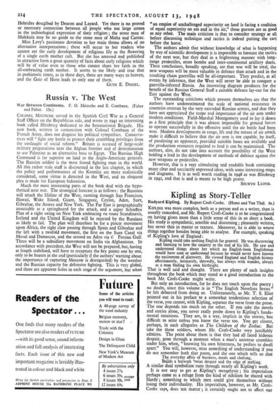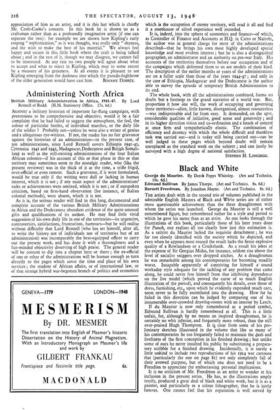Kipling as Story-Teller
Rudyard Kipling. By Rupert Croft-Cooke. (Home and Van Thal. 6s.)
Kimnsic was more complex, both as a person and as a writer, than is usually conceded, and Mr. Rupert Croft-Cooke is to be congratulated on having given more than a little sense of this in so short a book. His study is sympathetic, sensible and discerning ; pleasantly written, but never thin in matter or texture. Moreover, he is able to weave things together besides being able to analyse. For example, speaking of Kipling's love of England: Kipling could take nothing English for granted. He was discovering
and learning to love the country to the end of his life. He saw and understood things about her which no English-born Englishman would have seen or understood because he would never have known the excitement of discovery. He viewed England and English history affectionately, intimately, shrewdly, but always with wonder, always as a man finding his own birthright.
That is well said and thought. There are plenty of such insights throughout the book which may stand as a good introduction to the book Mr. Croft-Cooke might write.
But only an introduction, for he does not touch upon the poetry ; no doubt, since this volume is in "The English Novelists Series" he felt debarred from doing so. Unfortunately, as Mr. T. S. Eliot pointed out in his preface to a somewhat tendentious selection of the verse, you cannot, with Kipling, separate the verse from the prose. The one depends too much on the other. If you take the novels and stories alone, you never really probe down to Kipling's funda- mental intuitions. They are, in a way, implicit in the stories, but difficult to seize unless you know the verse too. You get closest, perhaps, in such allegories as The Children of the Zodiac. But take the three soldiers, whom Mr. Croft-Cooke very justifiably admires. The point about them is that they had all faced hideous despair, gone through a moment when a man's universe crumbles under him, when, "knowing his own bitterness, he prefers to dwell apart." You will, however, miss something of understanding if you do not remember both that poem, and the one which tells us that
The everyday affair of business, meals and clothing,
Builds a bulwark 'twixt despair and the edge of nothing.
A similar dual symbolitm* runs through nearly all Kipling's work.
It is not easy to get at Kipling's metaphysic ; his imperialism perhaps came as a refuge from the kind of nihilism he shared with Hardy ; something to which men could give themselves without losing their individuality. His imperialism, however, as Mr. Croft- Cooke says, does not matter ; it certainly ought not to affect our appreciation of him as an artist, and it is this last -which is chiefly Mr. Croft-Cooke's concern. In this book he is shown us as a craftsman rather than as a profoundly imaginative artist (if one can separate the two): for example we are shown how Kipling's early rasping "sophistication," as it was thought, was really only "shyness, and the wish to make the best of his material." We always feel happy and secure in this little book where the craft is being talked about ; and in the rest of it, though we may disagree, we cannot -fail to be interested. At any rate no two people will agree about what to accept and what to reject in Kipling, which may to some extent be a measure of his greatness. At all events it is pleasant to see Kipling emerging from the darkness into which the pseudo-highbrow of the older generation would have cast him. BONAMY DOBREE.



































 Previous page
Previous page